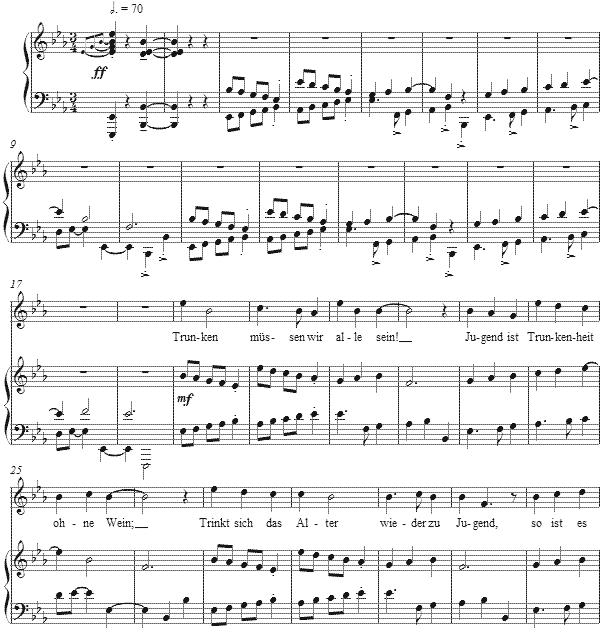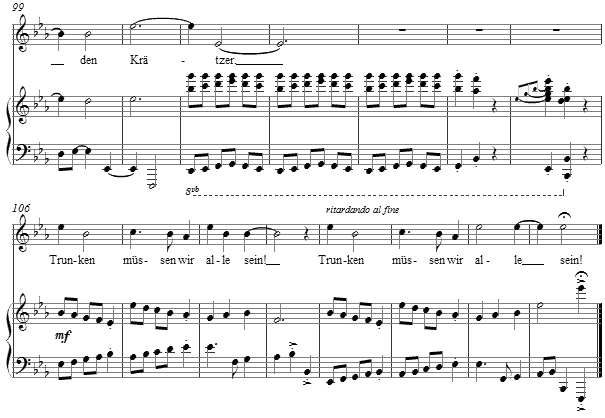Music and Texts of GARY BACHLUND
Vocal Music | Piano | Organ | Chamber Music | Orchestral | Articles and Commentary | Poems and Stories | Miscellany | FAQs
Trunken müssen wir alle sein - (2009)
Johann Wolfgang Goethe
for medium voice and piano
Trunken müssen wir alle sein!
Jugend ist Trunkenheit ohne Wein;
Trinkt sich das Alter wieder zu Jugend,
So ist es wundervolle Tugend.
Für Sorgen sorgt das liebe Leben
Und Sorgenbrecher sind die Reben.
Da wird nicht mehr nachgefragt,
Wein ist ernstlich untersagt.
Soll denn doch getrunken sein,
Trinke nur vom besten Wein!
Doppelt wärst du ein Ketzer
In Verdammnis um den Krätzer.[ 3 pages, circa 1' 40" ]
Johann Wolfgang Goethe
Goethe's drinking song -- one of many -- was written in 1815, as part of his West-östlicher Divan. A fine English translation appears in Emily Ezust's The Lied and Art Song Texts Page, an archive of almost 70 thousand texts and translations. Done by Malcolm Wren, it reads:
Drunk! We all ought to be drunk!
Youth is drunkenness without wine;
If old age can drink itself back to youth
that is a wonderful virtue.
Cares are part of our lovely life
but an antidote to care is available in grapes.
Let's hear no more about it!
Wine is seriously forbidden.
So if we are going to get drunk
Let's drink only the best wine!
You would be a double heretic
to be damned for drinking plonk.
Drunk! We all ought to be drunk!
Drunk! Drunk!
Translation copyright © 2006 by Malcolm Wren, reprinted here with kind permission.
The text is broken into three four-line verses, with an introduction and interludes between. The accompaniment as the vocal line could be aggressively played, in a bawdy, aggressive manner, to reflect the challenge in Goethe's text to Muslim authority as alcohol is forbidden, while Muslim poets across the ages have praised wine within such culture as calls it heretical. Omar Ibn al-Farid, a 12th-century Muslim poet, writes, "Joyless in this world is he that lives sober, / And he that dies not drunk will miss the path of wisdom."[ As cited in: Ibn al-Farid, Diwan, trans. RA Nicholson, Studies in Islamic Mysticism, Cambridge University Press, Cambridge; 1921.]
It is amusing to consider the evolving "big government" movements also take aim at dietary choices and habits with the intent of "correcting" human behavior, including the well known Prohibition which constrained the United States and was known as "The Noble Experiment," 1919 to 1933. Prior to this Volstead Act was the establishment of the Prohibition Party in 1869, from various temperance movements. Throughout history, nations and cultures have attempted to deal with man's use of alcohol, which ranges from appreciation to addiction, and throughout history such attempts continue to fail for very human reasons.
The first lines are repeated again in a short coda. Hugo Wolf's use of the text repeats in a similar manner, and such a reprise of the enthusiastic opening seems apt for a wine enthusiast. "A jug of wine, a loaf of bread, and thou beside me...."
The score for Trunken müssen wir alle sein is available as a free PDF download, though any major commercial performance or recording of the work is prohibited without prior arrangement with the composer. Click on the graphic below for this piano-vocal score.


